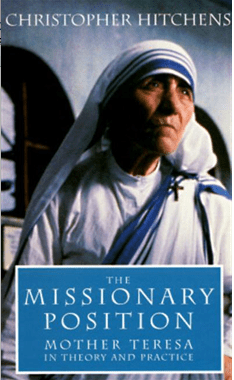Christopher Hitchens died yesterday and today lots of papers remember him saying stern words about Mother Teresa. Hitchens reportedly said:
“[Mother Teresa] was not a friend of the poor. She was a friend of poverty.”
And then called Mother Teresa:
“A thieving, fanatical Albanian dwarf.”
Did Hitchens really say those terrible things about her? Well, yes he did — although nobody seems to quote the original sources or talk about why he said them.
Here’s the backstory: In 1995 Christopher Hitchens wrote a small book titled The Missionary Position: Mother Teresa in Theory and Practice. (See Google Books for selections.) Mother Teresa had won the Nobel Peace Prize in 1979 and was widely considered a living saint, so naturally Hitchens, always the contrarian, felt compelled to go the other direction.

Christopher Hitchens didn’t like Mother Teresa, didn’t like blind admiration of her, and didn’t like the Catholic Church, so it was a fat target for him. He kicks off with quotes from, among others, Sigmund Freud:
“Where questions of religion are concerned, people are guilty of every possible sort of dishonesty and intellectual misdemeanor.”
“Who would be so base as to pick on a wizened, shriveled old lady, well stricken in years, who has consecrated her entire life to the needy and the destitute? On the other hand, who would be so incurious as to leave unexamined the influence and motives of a woman who once boasted of operating more than five hundred convents in upwards of 105 countries — ‘without counting India’? Lone self-sacrificing zealot, or chair of a missionary multinational?”
Hitchens quotes with disdain Mother Theresa’s comment on poverty: “I think it is very beautiful for the poor to accept their lot, to share it with the passion of Christ. I think the world is being much helped by the suffering of the poor people.”
The book made something of a stir at the time, naturally, but things really got interesting when Mother Teresa died two years later, just days after the death of Princess Diana. Hitchens had been a critic of both the princess and the Royal Family, so plenty of TV stations put him on the air to comment after Diana’s fatal car crash on August 31st.
He obliged by calling the public reaction “mass hysteria” and criticizing the non-stop coverage of Diana’s death:
“…we’ve been absolutely just drowning in drool, where the coverage has not been the objective coverage of an event, but the the forced recruitment of everybody into the same emotional mold. A great titanic outpouring of kitsch, in other words, where everyone is told that they’re all part of a great ‘we’ and that this great ‘we’ feels both bound together and enormously moved and hurt by something that actually is a non-event.”
“Words to avoid this week, or perhaps any week from now on: ‘idol’ and ‘icon.’ These once meant only the show-biz versions of graven-image worship, or the cult of mortal beings. Now they mean the real thing. And spiritual and secular leaderships compete to prostrate themselves. By the way, what have we ‘chosen’ for our idols and icons? A simpering Bambi narcissist and a thieving, fanatical Albanian dwarf. Nice going.”
Ouch!
Even Hitchens admitted he was pushing things a bit. “I admit, an exercise in seeing how far I could go,” he later told Steve Kroft of 60 Minutes.
(Both the Telegraph and MSN misquote him as calling Teresa “a lying, thieving Albanian dwarf.” Not lying, boys, merely fanatical!)
When Mother Teresa was beatified by Pope John Paul II in 2003, Hitchens wrote an article for Slate (titled “Mommie Dearest”) which is the source of that other popular quote:
“MT was not a friend of the poor. She was a friend of poverty. She said that suffering was a gift from God. She spent her life opposing the only known cure for poverty, which is the empowerment of women and the emancipation of them from a livestock version of compulsory reproduction.”
“Many more people are poor and sick because of the life of MT: Even more will be poor and sick if her example is followed. She was a fanatic, a fundamentalist, and a fraud, and a church that officially protects those who violate the innocent has given us another clear sign of where it truly stands on moral and ethical questions.”
Whatever Christopher Hitchens was or wasn’t, he certainly wasn’t afraid to lay it out there.
See our Christopher Hitchens biography »
{ Photo credit: user Turelio of Wikimedia Commons }
